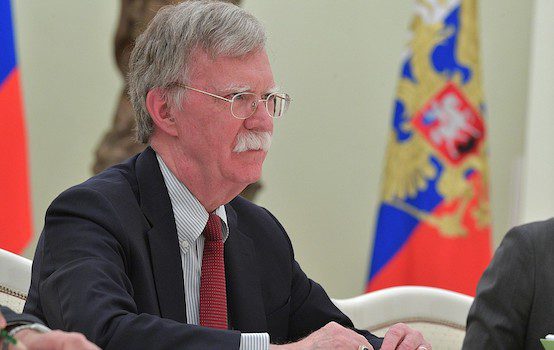John Bolton: Trump’s Foreign Policy Architect or Saboteur?

On December 19, as Christmas Day was fast approaching, Donald Trump delivered an early holiday gift to American troops stationed in Syria: pretty soon they would be packing their bags and getting out. To illustrate the point, the showman-turned-president released a video, one minute and 19 seconds long, of him in front of the White House portico proclaiming that the withdrawal was imminent. “After historic victories against ISIS, it’s time to bring our great young people home,” Trump said.
At precisely that time, the foreign policy establishment—a.k.a. The Blob—was springing into action. Their hearts beating wildly, they took to the airwaves and the op-ed pages to warn that a dopey president was making America less secure. David Ignatius, the longtime columnist at the Washington Post, wrote a column entitled, “Trump’s Syria withdrawal snatches defeat from the jaws of victory.” Democratic Senator Jack Reed, the ranking member on the Armed Services Committee, put out a statement pronouncing, “Just because President Trump tweets that he has defeated ISIS doesn’t make us safer, especially when the reality is very different on the ground.” Pentagon officials who were ordered to prepare for a quick withdrawal were privately hoping that the uber-hawkish Senator Lindsey Graham could persuade Trump to slow everything down.
And then there was John Bolton, the White House national security advisor and Blob member of 30-plus years who makes ancient Sparta look reasonable and peace-loving. While Bolton would never say so explicitly, it was obvious from the outset of Trump’s Syria decision that he didn’t support what his boss was doing. Indeed, it was only months prior that Bolton had said categorically that U.S. troops would not be leaving Syria as long as Iranian operatives or Iranian-sponsored militias were breathing Syrian air. Now, Trump had pulled the rug out from under Bolton and made him look foolish. He was outside the loop, ignorant of what his own boss was planning.
Bolton, a wily bureaucratic operator who knows how to slay inter-agency dragons, immediately went to work. If he and his like-minded colleagues at the Pentagon couldn’t persuade Trump to reverse the troop withdrawal, they could at least try to convince him to slow down implementation, drag out the process, and perhaps attach a few conditions to the drawdown. A more conventional president might have stuck to his guns, but Trump has a tendency to change his mind depending on whom he sees on Fox News (which could mean Lindsey Graham or Retired General Jack Keane, who isn’t exactly known for his foreign policy restraint). Bolton, Graham, and the swamp creatures understand this indecision perfectly well, and they took advantage of it. Soon enough, Trump was backing down from his original position and telling reporters that the troops would leave gradually.
Then, on Sunday, January 6, Bolton upped the ante. Speaking to reporters during his trip to Israel, he said that certain things would need to occur before American GIs could be pulled out. “This is a cause and effect mission,” Bolton commented. “Timetables or the timing of the withdrawal occurs as a result of the fulfillment of the conditions and the establishment of the circumstances that we want to see. And once that’s done, then you talk about a timetable.”
What are the conditions Bolton speaks of? First, the total elimination of the Islamic State—an objective any honest terrorism expert will admit is impossible (how does one “defeat” terrorism anyway?). And second, an assurance from Turkey that they won’t slaughter the Syrian Kurdish fighters now doing the bulk of the anti-ISIS work on the ground. What that assurance would look like is anyone’s guess. To Bolton, however, it doesn’t really matter: the trick is to slow Trump’s original announcement to such an extent that it’s made irrelevant. In his mind, the Syria mission isn’t about the Syrian people, Bashar al-Assad, or ISIS, but the evil Iranian empire swallowing up territory. Bolton’s obsession with regime change in Tehran starts with Syria—and if that means parking a few thousand more American ground troops in the desert indefinitely, so be it.
Is Bolton actually speaking for President Trump? Or is he freelancing like he did before the Singapore summit with North Korean leader Kim Jong-un, when his talk of the “Libya model” nearly upended diplomacy before it began?
If it’s the former, Trump needs to get in front of a microphone and level with the American people about why the policy has changed. If it’s the latter, he needs to immediately summon Bolton back to Washington and tell him in no uncertain terms that he has 10 minutes to put his things in a cardboard box before vacating the White House grounds.
Daniel R. DePetris is a foreign policy analyst, a columnist at Reuters, and a frequent contributor to The American Conservative.
Comments